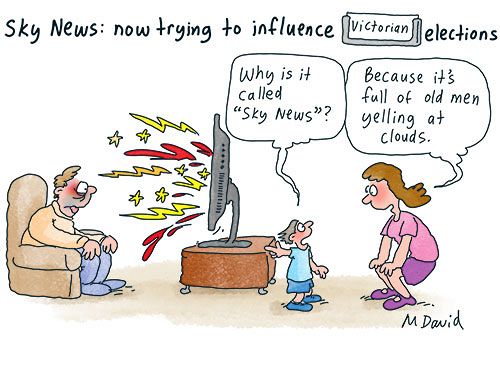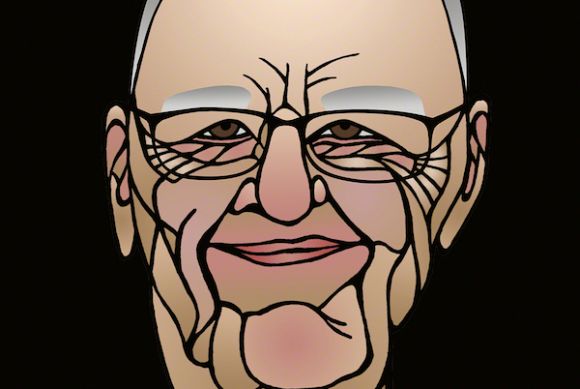More than 60% of recent complaints upheld by the Australian Press Council were against Rupert Murdoch’s News Corp. Alan Austin analyses the findings.
ONE OF THE MOST inexcusable abuses of a public platform occurred in May last year when a Daily Telegraph columnist joked that the result of the Federal Election:
‘...hasn’t gone down well with our off-shore country-shopper community, currently participating in a wave of plainly inept suicide attempts’.
In reference to suicides among asylum seekers, the opinion piece said:
‘Meanwhile, place your bets on the final number. Can they crack the half-century? Or even make it all the way to three figures? Go for it, boaties.’
An appalling front page of Murdoch’s Sunshine Coast Daily in May last year depicted rifle crosshairs superimposed on the face of Queensland Premier Anna Palaszczuk. The headline was: ‘Anna, you’re next.’
Adelaide’s Sunday Mail ran a series of articles in April 2018 bemoaning price rises by Stadiums Queensland which ‘is threatening the fiscal viability of the state’s top footy clubs’. It failed to disclose that as the major shareholder of the Brisbane Broncos, News Corp has a direct financial interest in rent levels.
These are among 16 articles by employees of Rupert Murdoch’s News Corp found by the Australian Press Council (APC) to have breached media standards.
The Council criticised ‘the mocking tone’ of the refugee self-harm article which ‘trivialises the suicide attempts’. It also noted the article ran without the required referral to sources of assistance.
Of the story with the rifle target on Anna Palaszczuk’s face, the Council said:
‘...it was deeply regrettable that the publication made the original decision to publish the image, initially refused to apologise and delayed in removing the image page from its digital platforms.’
Measuring the mendacity
Since the beginning of 2019, the Australian Press Council has concluded 34 investigations into complaints against media outlets. Of these, 24 were against News Corp outlets, six against Fairfax/Nine publications and four against others.
Of all 34 investigations, 26 articles were found to have breached the Press Council’s standards, agreed to by all member organisations and their 700+ publications.
That means only eight were not upheld, although some of these warranted warnings that the articles were indeed offensive and harmful but just avoided breaching the principles.
To clarify, having an article referred to the APC means very little. Some complainants are vexatious. We know this from this column having been reported to the APC on a number of occasions. All were dismissed as baseless without investigation after the writer or editor responded to the initial complaint. Having a complaint investigated, however, says there is a case to answer. Having a complaint upheld is quite shameful because the bar is pretty low. The fact that this has happened 26 times since January 2019 suggests all is not well with Australia’s media.
Murdoch media overrepresented
We know who the main culprits are. Of the 34 investigations completed, ten were into articles published by Sydney’s Daily Telegraph. That is nearly 30% of all complaints — by one newspaper. These included the most reprehensible breaches of the standards.
Melbourne’s Herald Sun generated four investigations, The Australian three, Brisbane’s Courier Mail two, and five other Murdoch outlets one each. So overall, Murdoch’s media accounted for 24 out of the 34 complaints investigated. That is more than 70%.
Of the 26 complaints upheld, 16 were from Murdoch publications — 62%.
Bolt denigrates minorities again
Andrew Bolt has not learned from previous adverse APC findings. Nor from losing the Popovic case. Nor from the absolute shellacking he copped from Justice Bromberg in the celebrated racial vilification case Eatock v Bolt.
His Herald Sun column in August 2019 referred to teenaged climate activist Greta Thunberg as ‘freakishly influential’ and ‘deeply disturbed’ and commented:
‘I have never seen a girl so young with so many mental disorders treated by so many adults as a guru.’
The APC slammed Bolt’s column, finding that ‘there was no public interest in undermining the credibility of a person, her opinions or her supporters on the basis of her disabilities...’.
Specific standards snubbed
The APC found the 16 offending Murdoch articles breached the standards 26 times:
- Principle one – ensuring factual material is accurate – was breached seven times;
- Principle two – publishing corrections where wrong – was breached twice;
- Principle three – fair opinions based on accurate facts – was breached seven times;
- Principle six – avoiding offence, distress or risk to health and safety – was also breached seven times. That is appalling;
- Principle seven – publishing material gathered by deceptive means – was breached once; and
- Principle eight – avoiding or disclosing conflicts of interests – breached twice.
Fake news
Several articles which fell foul of Principles one, two and three were not just inaccurate, they were blatantly false.
The Australian accused the Bureau of Meteorology of fraud. There was no evidence for this. The Daily Telegraph claimed ‘soldiers are being told they shouldn’t use words like “him”, “her” or even “they” in case it offends peers in a new official guide’. The guide said no such thing.
The Herald Sun headed an article, ‘Ban the books: Councils’ gender war to hit kinders, libraries’. The adjudication found the article baseless and noted ‘that the publication did not refer the Press Council to any instance where banning of books was proceeding’.
The remedy
The APC has been in business now for 45 years. While its influence is positive overall, it has not curbed the continual distortions, falsehoods, character assassinations and smears published routinely by the Murdoch press.
For these to end, those publications must be shut down — as happened to News of the World in Britain in 2011 and to 60 unprofitable suburban and country newspapers in Australia this year.
So we must join and strengthen the boycott of the newspapers and their advertisers to ensure all Murdoch publications lose money and eventually disappear. Sooner the better.
Alan Austin’s defamation matter is nearly over. You can read an update HERE and help out by contributing to the crowd-funding campaign HERE. Alan Austin is an Independent Australia columnist and freelance journalist. You can follow him on Twitter @AlanAustin001.
Related Articles
- Morrison and Murdoch take on Google and Facebook
- Why we must confront the racism of 'The Australian' cartoon
- Trump, the pandemic and the News Corp misinformation machine
- What is really wrong with our media: The Eden Monaro example
- News Corp derides again! U.S.-owned 'The Australian' tells Sleeping Giant lies
 This work is licensed under a Creative Commons Attribution-NonCommercial-NoDerivs 3.0 Australia License
This work is licensed under a Creative Commons Attribution-NonCommercial-NoDerivs 3.0 Australia License
Support independent journalism Subscribe to IA.















